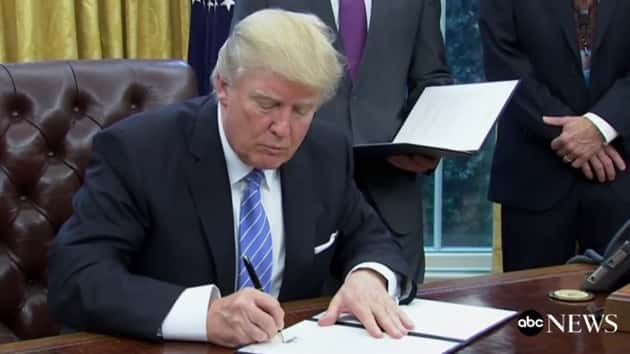 ABC News(WASHINGTON) — In the wake of a horrific chemical attacks this week that left at least 86 dead in Syria, including dozens of women and children, Donald Trump lashed out at the Assad regime, calling the actions “heinous” and hinted that he was going to take action to address the wrong.
ABC News(WASHINGTON) — In the wake of a horrific chemical attacks this week that left at least 86 dead in Syria, including dozens of women and children, Donald Trump lashed out at the Assad regime, calling the actions “heinous” and hinted that he was going to take action to address the wrong.
The president expressed horror that “beautiful babies were cruelly murdered in this very barbaric attack.”
On Thursday night, Trump launched a strike against an air base that the planes carrying the chemical weapons launched from, in a show of action against the brutal attack, the aftermath of which was captured on videos.
The chemical attacks come amid Syria’s 6-year civil war, which has left some 6.5 million people displaced, according to the UNHCR, and some 470,000 dead as of February 2016, the New York Times said, citing the Syrian Center for Policy Research.
Trump appears to have taken a very different view towards refugees from that country, seeking to bar them indefinitely with his attempts at a travel ban, despite an outcry not to do so.
Here is a look at how Trump has responded to both humanitarian crises.
His campaign rhetoric
In November 2015, five months after announcing his presidential campaign and in the wake of the Paris terror attacks, Trump reaffirmed his belief that refugees posed a threat to the United States.
“We have no idea who these people are, we are the worst when it comes to paperwork,” he said to CNBC. “This could be one of the great Trojan horses.”
“We cannot let them into this country, period,” Trump said at the time. “Our country has tremendous problems. We can’t have another problem.”
Throughout the campaign, Trump slammed then-rival Hillary Clinton for calling for an increase in U.S. acceptance of Syrian refugees.
“She [Clinton] proposes this despite the fact that there’s no way to screen these refugees in order to find out who they are or where they come from. I only want to admit individuals into our country who will support our values and love our people,” Trump said during his speech at the Republican National Convention.
Trump is not the only one in his family to speak out against refugees.
On Sept. 19, Donald Trump Jr. sparked an uproar when he tweeted a picture of a bowl of Skittles with a message reading “If I had a bowl of skittles and I told you just three would kill you. Would you take a handful?” Trump Jr. added the caption “This image says it all. Let’s end the politically correct agenda that doesn’t put America first. #trump2016” on his tweet.
The tweet has not been deleted but the photo has been removed based on copyright infringement.
The cautious approach towards Syrian refugees extended to the very end of the campaign, with Trump slamming Clinton’s proposed increase in the program during a Nov. 2 rally in Miami where he said “her plan would mean generations of terrorism and extremism spreading in your schools and all throughout your communities.”
His solution — and promise — came immediately after. “When I’m president, we will suspend the Syrian refugee program,” he said both at that rally and at many others ahead of the election.
Language used by his administration
Trump tried to do just that on Jan. 27, 2017, when he issued an executive order — the first iteration of the proposed travel ban. The order instituted a 120-day suspension of the American refugee program and additional language that suspended refugee resettlement indefinitely for Syria nationals.
“I hereby proclaim that the entry of nationals of Syria as refugees is detrimental to the interests of the United States,” Trump’s first order stated, “and thus suspend any such entry until such time as I have determined that sufficient changes have been made… to ensure that admission of Syrian refugees is consistent with the national interest.”
Instead he promised to create “safe zones” to give haven to those fleeing conflict, instead of letting them into the U.S.
The move provoked a backlash, including from the UNHCR, which said it was “alarmed” at the development.
“UN High Commissioner for Refugees Filippo Grandi is deeply worried by the uncertainty facing thousands of refugees around the world who are in the process of being resettled to the United States,” the organization said in a statement on Jan. 30.
“This week alone, over 800 refugees were set to make America their new home, but instead find themselves barred from travelling to the U.S. UNHCR estimates that 20,000 refugees in precarious circumstances might have been resettled to the United States during the 120 days covered by the suspension announced Friday, based on average monthly figures for the last 15 years. Refugees are anxious, confused and heartbroken at this suspension in what is already a lengthy process.”
Trump’s order was revoked when the second iteration of the travel ban was issued on March 6, and the language banning Syrian refugees indefinitely was stripped from that version. But that second iteration, which was to take effect on March 16, was blocked by a federal a judge in Hawaii.
Noting a shift
Trump’s language about Syria appeared to shift dramatically this week, however, after the chemical attack.
During a joint press conference with Jordanian King Abdullah II in the White House Rose Garden on Wednesday April 5, Trump condemned the attack.
He described it as “a chemical attack that was so horrific in Syria against innocent people, including women, small children, and even beautiful little babies, their deaths was an affront to humanity.”
“It crossed a lot of lines for me. When you kill innocent children, innocent babies, babies, little babies, with a chemical gas that is so lethal, people were shocked to hear what gas it was, that crosses many, many lines, beyond a red line, many, many lines,” he said.
And then the next day, shortly after ordering the targeted military strike on an air base in Syria, Trump held a press conference confirming the attack and giving some insight into his motivation.
“Using a deadly nerve agent, Assad choked out the lives of helpless men, women and children. It was a slow and brutal death for so many. Even beautiful babies were cruelly murdered in this very barbaric attack. No child of God should ever suffer such horror,” he said.
“We pray for the lives of the wounded and for the souls of those who have passed,” he said later in the remarks.
Copyright © 2017, ABC Radio. All rights reserved.


